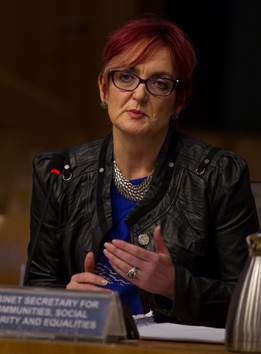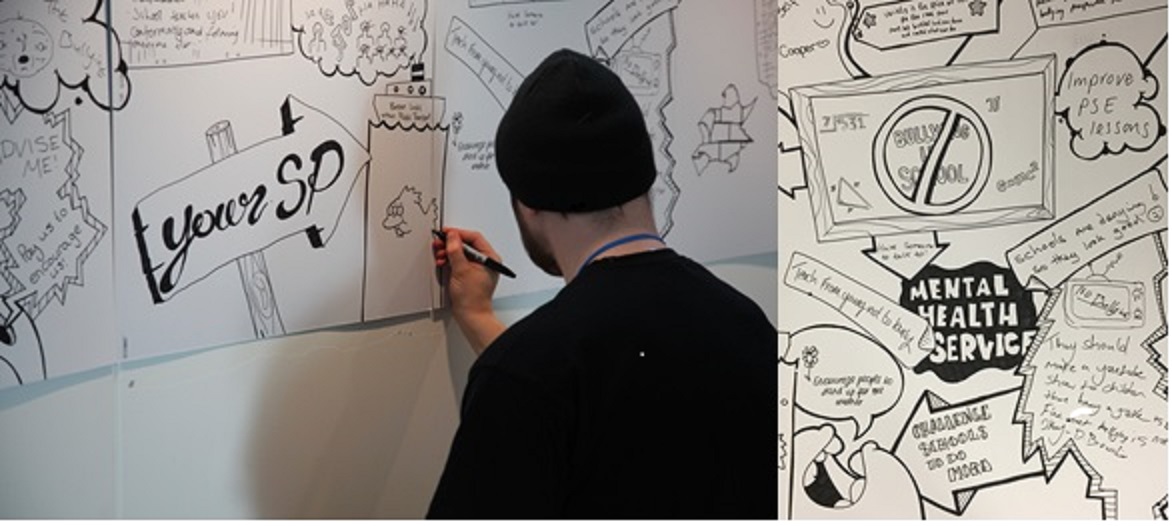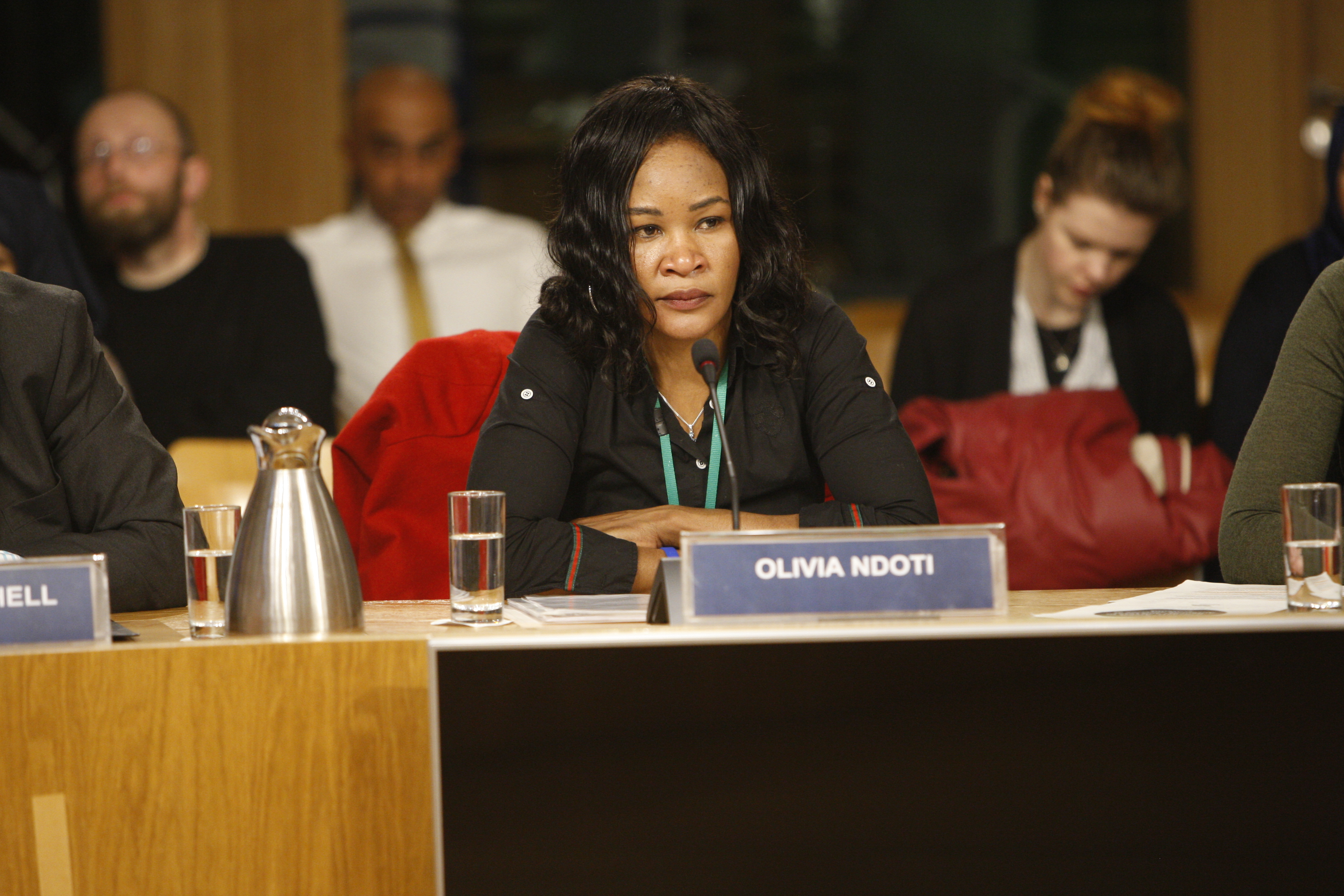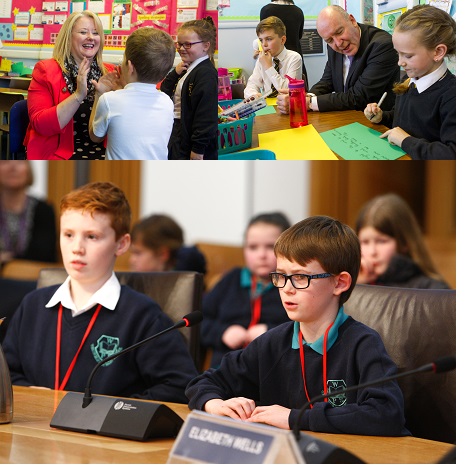Equalities and Human Rights Committee
Annual Report 2016-17
Introduction
All committees are required to produce an Annual Report covering the "Parliamentary Year", which began when the Scottish Parliament first met after the election in May 2016.
This report covers the work of the Equal Opportunities Committee (8 June – 29 September 2016) and the Equalities and Human Rights Committee (from 30 September 2016) during the Parliamentary year from 12 May 2016 to 11 May 2017.
The Parliament agreed on 27 September to extend the remit of the Equal Opportunities Committee to include human rights and changed the name of the Committee to more accurately reflect its remit. A video was produced to help communicate the change to stakeholders.
Membership Changes:
Previous Members of the Committee during the reporting year:
Willie Coffey (from 8 June 2016 – 30 March 2017)

Inquiries and reports
The Committee's remit and formation of its work programme
The early part of the Parliamentary year was spent working with stakeholders to identify a work programme for the first year of the Parliamentary session. The Committee began by hearing from the Cabinet Secretary for Communities, Social Security and Equalities (including on human rights) in 30 June 2016. 1

Around 40 stakeholders were invited to round-table sessions to talk about their key priorities. In advance of the three evidence sessions, held on 82, 223 September and 6 October 20164, the Committee hosted breakfast meetings with stakeholder service users who shared their life experiences. Given the remit’s cross-cutting nature, following these sessions the Committee wrote to subject committees, highlighting matters falling within their remit to help inform their work programmes.
Concerns were raised about the ability of the Committee to devote sufficient time to equality matters because the remit had been expanded to include human rights. The Committee balanced these matters by adhering to agreed key principles to consider both equality and human rights aspects through each piece of work, identifying where most value can be added, and avoiding unnecessary duplication.
Scrutiny of human rights
The Committee agreed to undertake an inquiry into its extended remit with a view to gathering information on how best to scrutinise human rights in the Committee and more widely in the Parliament. This is being conducted in a phased approach. Thus far a literature review has been conducted and some general awareness raising has taken place. The next phase, a specific research project is being scoped.
Bullying and harassment of children and young people in schools in Scotland
Following on from the stakeholder sessions the Committee held an evidence session on 10 November 20161, where the Committee heard from equality groups: CRER, Inclusion Scotland, LGBT Youth Scotland, NSPCC/Childline Scotland, Rape Crisis Scotland, Respect Me and Time for Inclusive Education. The Committee agreed to explore issues relating to the bullying and harassment of children and young people in the school system. The inquiry considered the protected characteristics, such as gender, sexual orientation, gender identity, faith, race or ethnic background, disability etc., as well as issues around the growing use of bullying using social media and the normalisation of sexualised bullying of girls and young women. The Committee wrote to the Deputy First Minister, who in response agreed to postpone the refresh of the National Anti-bullying Strategy to enable the Committee to contribute.
The Committee held a further session on 26 January 20172 with a range of professional bodies and education authorities and considered matters relating to anti-bullying policies, training and professional development of teachers and leadership in schools. In March 2017, the Committee visited the Vale of Leven Academy and discussed bullying with students and teachers. Three workshops were also held at the ‘Your Scottish Parliament’ event to gather views from college students. A questionnaire was issued to teachers coming to visit the Parliament. The Committee liaised closely with the Education and Skills Committee. Engagement work is ongoing and the Committee expects to report in June 2017.

Destitution, asylum and insecure immigration status in Scotland
The Scottish Refugee Council, British Red Cross, Scottish Women’s Aid, and the Office of the children and young people's commissioner had called for an urgent inquiry into destitution, asylum and insecure immigration status. Members held an informal meeting with stakeholders and subsequently, formally agreed and launched an inquiry with a call for views which received 107 submissions. A significant proportion of the responses were personal accounts from destitute people. The inquiry investigated the causes of destitution, the support being provided to destitute people by non-government organisations and public authorities and the steps that could be taken to mitigate destitution.
Over February and March 2017, members visited Shakti Women’s Aid, the British Red Cross, Destitute Asylum Seekers’ Service and also held two informal meetings with Hemat Gryffe Women’s Aid and public health nurses. Private briefings were held to enable people to share openly their sensitive, personal stories. Evidence sessions were held in March, including hearing directly from a destitute asylum seeker, Olivia Ndoti, on‑the-record about her experience of destitution. A final evidence session was held on 20 April 20171, where the Cabinet Secretary for Communities, Social Security and Equalities told the Committee about the action the Scottish Government was taking. The public evidence sessions and testimonies led to considerable media coverage.

At the last meeting of the Parliamentary year, 11 May 2017, members considered a draft report and this will be available at the time of publication of this report.
The UK's departure from the EU (Brexit) and implications for equalities and human rights
The Committee has been monitoring the potential impact of Brexit on equalities and human rights and has held two evidence sessions. Academics shared their views at the first session on 3 November 20161, following which the Committee wrote to the UK and Scottish Governments raising concerns and seeking clarification on the ceasing of applications of the Charter of Fundamental Rights (the Charter) and that there will be no ability to seek the opinion of the European Court of Justice. Other matters of concern were the loss of EU funding streams to equalities and human rights advocacy and support services and the impact on community cohesion and treatment of EU nationals. More recently, on 27 April 20172, the Committee considered the potential impact on third sector funding and community rights, hearing from SCVO and the Third Generation Project. It is expected further sessions will be required as negotiations progress.
Other evidence sessions
The following topics were also the focus of evidence sessions:
The annual report and strategic plan of the Scottish Human Rights Commission
The work programme and forthcoming priorities of the Equalities and Human Rights Commission for Scotland
(This one-off evidence session served as a scoping session for a forthcoming inquiry ‘Transition from education into employment’).
Bills
Draft Budget 2017-18
Delayed publication of the budget meant there was limited time to scrutinise the Government‘s spending plans. The Committee agreed to focus scrutiny of the proposed budget on access of disabled people and BSL users to Scottish universities, as disabled people account only for 10% of all undergraduates attending Scottish universities, but nearly one in five people of working age (1 million people) in Scotland are disabled. By taking an outcomes based approach the Committee was able to examine how the university sector was using funding of £640 million for widening access, particularly disabled applicants and students. While also looking at compliance with its duties to disabled people and BSL users in terms of eliminating inequality and discrimination. The Committee targeted its examination on:
Universities’ outcome agreements and specific objectives to widen access to disabled people and BSL users,
whether the University sector was meeting its objectives and duties,
what changes needed to be implemented to ensure Scottish Government funding was achieving the best outcome for disabled applicants and students.
In its Report, the Committee made a number of recommendations to the Scottish Government, the Scottish Funding Council and to universities to improve outcomes for disabled people and will use this information to scrutinise future spending plans in this area. The Committee also took the opportunity to scrutinise budgetary implications through its self-initiated inquiry work and reported to the Finance Committee on the equalities budget and the Budget Equality Statement and highlighted a need to consider how human rights are considered in budgetary terms.
Subordinate legislation
In January 2017, the Committee considered a negative instrument: the Civil Partnership, Marriage Between Persons of Different Sexes and Same Sex Marriages (Prescribed Bodies) (Scotland) Amendment Regulations 2016 (SSI 2016/427). This prescribed the Humanist Society Scotland as entitled to register civil partnerships, without the need to be registered individually as approved celebrants.
Petitions
During the previous parliamentary year, the Session 4 Equal Opportunities Committee considered one petition PE1372 on ‘access to justice in environmental matters’ made by Friends of the Earth Scotland. This Petition was continued into this Parliamentary session. No work has been undertaken to date as the Committee is awaiting the courts review and review of court costs before undertaking any consideration.
Engagement and events
Throughout the reporting year the Committee carried out a number of engagement activities and hosted various events relevant to the Committee's remit. These were helpful in raising awareness of a range of equality and human rights issues, in making new contacts and reaffirming existing connections, whilst reaching a wider audience.
Through its stakeholder meetings, the Committee identified primary school children had rarely had an opportunity to provide formal evidence to committees of the Parliament. To mark International Human Rights Day on 10 December 2016 members, with the Parliament's outreach service, visited Thornlie Primary School in Wishaw, North Lanarkshire and Westfield Primary School, West Lothian and worked with the pupils to enable them to build their confidence to give evidence to the Committee. On 8 December 2016, pupils as young as 6 years old participated in a Committee meeting where they spoke about the work of their schools in promoting and respecting human rights and also explained what their human rights priorities were.

Events hosted included:
British Council on Gender Inequality
Moderator of the General Assembly of the Church of Scotland on homelessness
the Alwaeed Centre Edinburgh University on Muslim Communities in Scotland
Screening of the film ‘Selma’
Chaired Scotland's HIV anti-stigma consortium
Chaired SPICe breakfast seminars on impact of Brexit on equalities and human rights
Chaired Scottish Older People's Assembly
In addition, the Committee wrote to its UK counterpart committees to set up a regular Chairs/Conveners meeting to discuss issues of mutual interest. Arrangements are currently being made for the inaugural meeting.
The Committee has continued to engage with the stakeholders and members of public via Twitter and currently has 1640 followers.
Equalities
The Committee's calls for views on its inquiry into destitution were translated upon request into other languages, for example, Arabic, Farsi and Kurdish Sorani. The Committee intends to translate its key findings to ensure those who participated in the inquiry can see what happened to their evidence.
On the disabled access to universities inquiry, the Committee consulted several disability groups on the style and tone of the call for evidence, as well as on the forms it should be available in and which social media channels to use to reach different audiences. As a result the Committee prepared a Facebook video, as well as a version of the call for evidence in BSL, and in MP3 audio format. Meetings on this inquiry were also BSL interpreted.

Meetings
During the Parliamentary year, the Committee met 23 times—
21 meetings had items in private, and
2 meetings were wholly in private.
The meetings held wholly in private were on 27 October and 23 February and were entirely given to further consideration of the Committee's work programme.
No external formal Committee meetings were held during this parliamentary year.